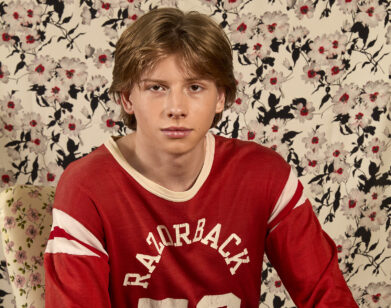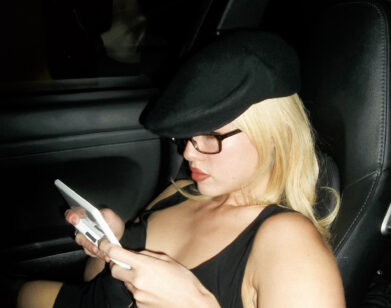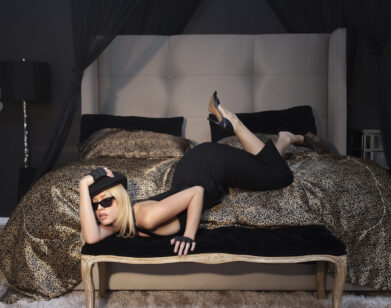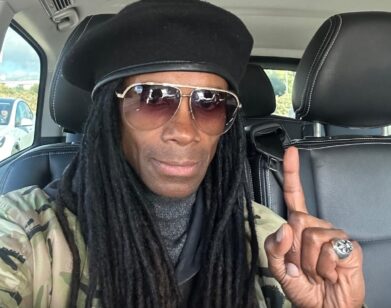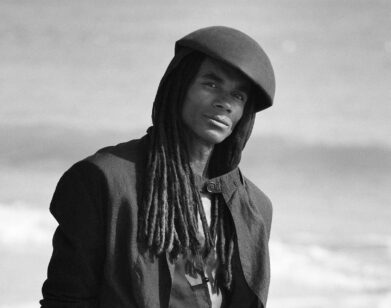SLØTFACE
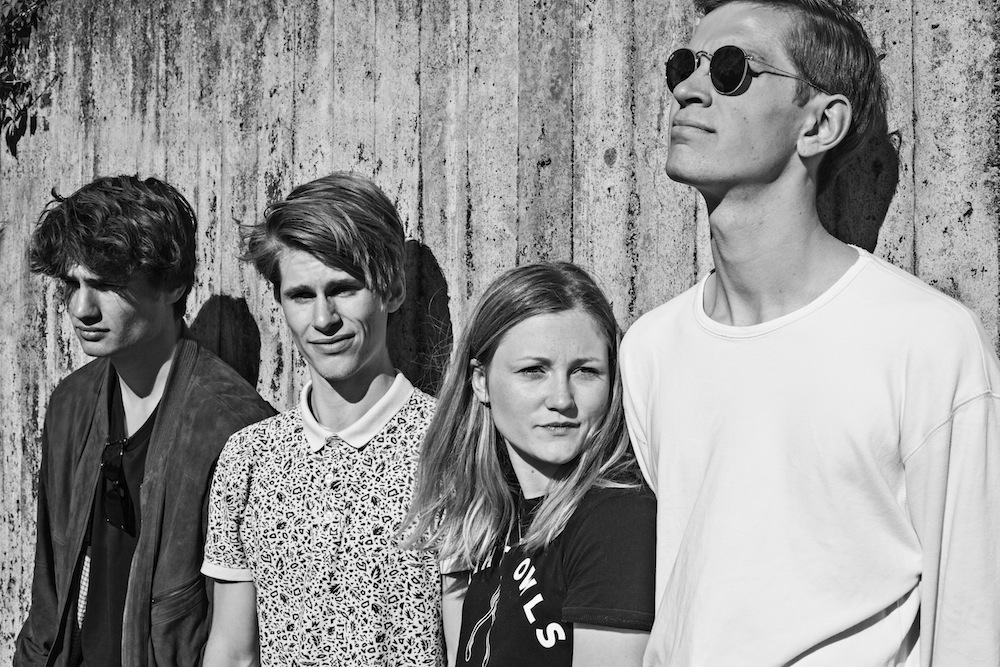
SLØTFACE IN OSLO, NORWAY, AT ØYA FESTIVAL, AUGUST 2016. FROM LEFT TO RIGHT: HALVARD SKEIE WIENCKE, TOR-ARNE VIKINGSTAD, HALEY SHEA, AND LASSE LOKØY. PHOTO: VICTORIA STEVENS.
In 2012, four high schoolers from a small town on Norway’s west coast formed Slutface, a pop-punk rock band. Beyond the fact they they all lived in Stavanger—and that their first CDs were by Green Day—the four-piece, which consists of Haley Shea, Lasse Lokøy, Tor-Arne Vikingstad, and Halvard Skeie Wiencke, held a common belief: being in a band was not merely a youthful phase.
“We wanted to be in a band where people took it seriously and we wanted to actually go for it, and try and record music and play music as much as possible,” says Shea when we meet the band at Øya Festival. “We picked our favorite people to be with, then we recorded a couple of demos and got our first shows, and things kind of snowballed from there.”
The band has mutated since their inception by embracing the badass riot grrrl movement and its inherent feminism, and in April 2016 changed their name to SLØTFACE, which is both a reference to their Scandinavian roots and a response to the internet censoring their former moniker. Their sound embraces the fierce, satisfying aggression of punk and hardcore and the foot-tapping, bounce-around vigor of pop. Here, we’re pleased to premiere the music video for the band’s latest single, “Take Me Dancing.” It features confetti, spray paint, and SLØTFACE drummer Halvard Skeie Wiencke, and was directed by the band’s guitarist, Tor-Arne Vikingstad. It’s a fitting celebration as they announce their first U.S. tour, which kicks off on December 1 at Baby’s All Right in Brooklyn. This fall, they’ll release an EP via Propeller Recordings, and their debut LP is soon to follow.
BAND NAME: SLØTFACE
THE BASICS: Haley Shea, vocals and lyricist, age 22; Lasse Lokøy, bass, age 20; Tor-Arne Vikingstad, guitar, age 22; Halvard Skeie Wiencke, drums, age 19
HOMETOWN: Stavanger, Norway
BASED: Haley Shea: We all live in Bergen. It’s four hours north of where we’re from. It’s a really good music town, and it has a really good scene. A lot of the bands that are playing Øya this week are from Bergen. We like living there. It’s a good place, it rains a lot, but that’s okay.
FROM SLUTFACE TO SLØTFACE: Lasse Lokøy: Slutface, first of all, was meant as a joke. We thought, “Oh, it would be so fun to call our band Slutface.” Afterwards, when Haley’s lyrics became more feminist, we decided to keep our name and use it as a statement. People would ask us why we were called Slutface and we could say that it was in an ironic way to tell people how the music industry sometimes portrays women. We thought that was a good arena to talk about feminism. But when we would play shows outside of Norway it became more and more difficult to still reach people because of the censorship on the internet.
Tor-Arne Vikingstad: Yeah, we couldn’t really advertise for shows in the UK through Facebook and Twitter. It was so stupid.
Lokøy: So we changed one letter to trick it, to still be able to advertise and go around and tell the same message, but with another letter.
Shea: It kind of reinforces the whole point of the original name, the fact that we had to change it, because why is slut a word that people associate with such negative things? And why do those connotations [mean] that it has to be censored as the automatic response for people? Really, it just reinforces our point of it being ridiculous that that’s a word that people feel the need to censor.
A LYRICAL SHIFT: Shea: The more I learned about riot grrrl, Bikini Kill, and Kathleen Hanna, the more I wanted to [write that way]. I’ve always been really into punk but that whole white, angry male thing was a little bit distancing for me. Then, I found out about Bikini Kill and was like, “Shit, this is perfect. This is exactly what I’ve been trying to do the whole time.” Before, when we first started out, our lyrics were a lot about the way that popular culture makes our generation apathetic, because you have all of these expectations of what it should be like to be a teenager, and what is should be like to be in love, or feel angsty and lonely, and then those things don’t necessarily match up with the way that reality is. We still pick up on that theme a lot, but it’s a lot more regarding gender and the way that your gender actually ties in with a lot of those expectations of what it’s like to be a teenager.
THEIR FIRST GIG: Halvard Skeie Wiencke: I wasn’t really a part of it, so I don’t know anything about it.
Shea: [laughs] He broke his arm before our first show and couldn’t play.
Wiencke: I broke my arm snowboarding or something, and they played without me. They found another drummer, I was really hurt, and I cried for like two days afterwards! [laughs] It was fine.
Lokøy: Then we played a much better gig afterwards, which was our official first gig.
Wiencke: Yeah, it was at a local club. It was lots of fun. We’ve played there many times since and it’s always like our reunion concert. When we go back to our hometown, we play that club and celebrate that we’ve come this far.
Vikingstad: It takes us back to the roots. [laughs]
THE NORWEGIAN INFLUENCE: Lokøy: I feel like the [melancholic tone] of Norwegian music is one way to approach it—a lot of electronic music has that vibe—but we’ve chosen another path.
Vikingstad: There’s the aggressive element as well.
Shea: We think that there are two ways to [incorporate] it. Like Lasse said, a lot of the electronic music has the Scandinavian ice queen vibe to it. But from our part of the country, the metal scene, the hardcore scene, and the punk scene are a big deal; that’s what’s important and those are the shows that we grew up going to. The hardcore shows were the only under 18 shows that you could get into. For us, that aggressive and angry side has really influenced us in the Norwegian part, but we feel like there’s this expectation for Scandinavian artists to have that cool, cold approach to things. We love that and admire it so much, but we’re not as cool as they are. We’re nerds.
Vikingstad: We’re only putting on a show, you know!
Shea: We can’t really relate to that. We’re not as cool any of those Scandinavian artists, so we get nervous when we play Scandinavian showcases because everyone else is always cooler than us. But we survive, we’re okay.
BEING FEMALE-FRONTED: Lokøy: Some people think maybe it’s more difficult to tour around with other genders for some reason. It’s like, “What’s it like to be in the same car with three guys all of the time, Haley?” And she’s like, “Well, it’s boring but it’s fine.” [laughs]
Vikingstad: I always think about this story of a friend of mine, who wanted to play drums when she was nine years old, and she was going to this music school. They said, “Well, you’re not going to have a good time here; it’s just boys.” So she started playing piano or flute.
Lokøy: Because that’s more “female.”
Vikingstad: Yeah, and the problem is that guy has the expectation of when a boy and a girl are together doing something, there has to be some romantic involvement or attention. People don’t really think about [the fact] that most males and females are just having a good time, working together, and doing stuff, and that’s not an element that should be thought of. It should be a natural thing.
Shea: I think the worse thing we encounter is actually from other musicians. The worst experiences I’ve had at least have been from all male bands that we play with, that come on tour. I’ve had male bands tell me, “I could never be in a band with a girl because someone would definitely be trying to hit on her all the time,” and bullshit like that. I think it all depends on who you play with as people; it doesn’t really matter what gender you are—if you’re a dick, you’re a dick.
Lokøy: At the start, people were calling us a “girl band” because we have a frontwoman.
Vikingstad: There were journalists continually writing, “All female rock band.”
Wiencke: We’ve also been called “Haley and the pretty boys”—that’s our favorite probably.
Shea: It’s also the thing that it should be okay for a man to be feminist too. For us, feminism is all about being judged on your personality, who you are, and the things you have to say, and not your gender—that goes for men, women, and all genders. That’s equally annoying, when people expect it to be me, the feminist, and the three men that I play with that are just like, “Blah, blah, I don’t even care!”
FOR MORE ON SLØTFACE, VISIT THEIR WEBSITE.
For more Norwegian acts to know from Øya Festival 2016, click here.

